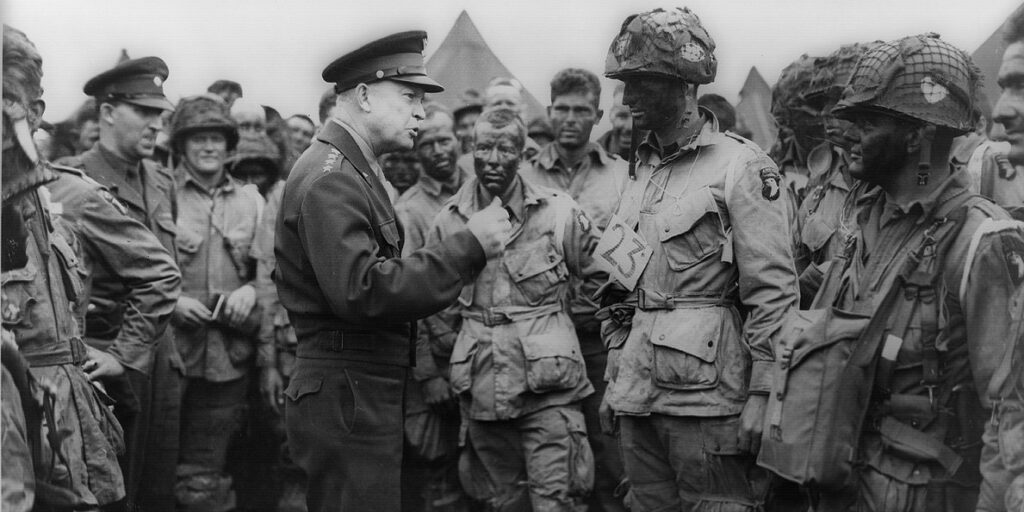“They Bought Us Time to Do Better”
One week before D-Day, on May 29, 1944, Britain’s air chief marshal Trafford Leigh-Mallory approached General Dwight Eisenhower with a warning. As commander of the airborne assault on D-Day, Leigh-Mallory’s paratrooper and glider units would be among the first to assault Hitler’s Atlantic Wall, and the British general was worried. The Germans had been reinforcing parts of the region targeted by U.S. airborne forces. By his calculations, glider forces would suffer 70% losses; paratroopers wouldn’t fare much better, losing 50% of their strength in the assault. Leigh-Mallory called the prospect “futile slaughter” and recommended to Eisenhower that he scrap plans for the jumps by the American 82nd and 101st airborne divisions.
Eisenhower told Leigh-Mallory to put his proposal in writing—a paper-trail to protect the British officer as much as anything—and retreated to the privacy of his own counsel to think. Ultimately, Ike kept the airborne assault in the plan—convinced that the added mass of U.S. forces dropped behind enemy lines would be essential to the success of operations on Utah and Omaha beaches.
But that’s not the end of this story.
On June 5, as airborne troops marshaled at airfields across England, Eisenhower was among them. In some of the most iconic images of the Second World War, we see Ike, animated, smiling, gesturing, talking to young men he was sending into a fight his top commander expected to be a “slaughter.” Eisenhower felt an obligation to be among them, to ask them about home, and to look them in the eye. He didn’t feel like he had to tell them what they were going to do. They all knew. He was there to remind them why.
Twenty years later, CBS News announced that Eisenhower would return to Normandy with Walter Cronkite to film a special retrospective on that day of days. Before he left, Eisenhower’s office received a letter from the mother of an American soldier who was buried at Coleville-sur-Mer, the American military cemetery overlooking Omaha Beach. She hadn’t been to France and didn’t expect to ever travel there. She asked Eisenhower, the former commander of the Allied Expeditionary Force, to pay respects at the grave of her son, PFC Herbert Kaufman, Plot B, Row 10, Grave 188.
Eisenhower did just that, not for the news cameras and not for publicity. He did it for Mrs. Kaufman and her son and all the others like them.
Weeks later, in the CBS News special, Eisenhower said of those men lost on D-Day and over the entire course of World War II, “they bought us time to do better.” I’ve thought of that statement over the years, whenever our country has faced trial and challenge and choices. “They bought us time to do better.” The retired general wasn’t talking about time to do better against the Nazis they fought in 1944 or the Soviets we faced in 1964. His statement wasn’t political, it was timeless. It was a soldier’s recognition that the blessings of liberty are won with the blood of young Americans sent in harm’s way. The statement “they bought us time to do better” wasn’t about geopolitics, it was about who we are as a nation, what sins we have still to confess, and what demons we have still to expel.
I have long admired Eisenhower’s practical idealism as president. We don’t think of Ike as a great leader in the civil rights movement, but he helped lay the foundation for progress in the decade that followed his presidency. He completed the desegregation of the U.S. military; on his own authority he desegregated Washington, DC; and he deployed federal troops to enforce the Supreme Court’s decision overturning segregation in public schools. When he had the opportunity to nominate a Supreme Court justice 38 days before the election of 1956, Ike told his attorney general to find a Democrat he could nominate. Eisenhower was the first Republican president since 1932, but he believed the Supreme Court should never be viewed as a partisan institution.
Eisenhower’s life and legacy are reminders to all of us about the personal qualities of effective leaders. He took blame but deflected credit. He held himself personally accountable for his decisions—to the point where he would look men in the eye who he knew he was sending into grave danger. He honored the sacrifice of those who died in the service of this country, and he understood their loss meant more than another entry on the honor roll of war dead. As president, he governed by controlling the things he could control, while remembering that he served all Americans, not just the people who voted for him.
More than 75 million Americans have already cast their votes in this year’s election. Tens-of-millions more will go to the polls between now and next Tuesday. Every one of us who does so faces a stark choice about what America will do with the time those G.I.s bought us.

